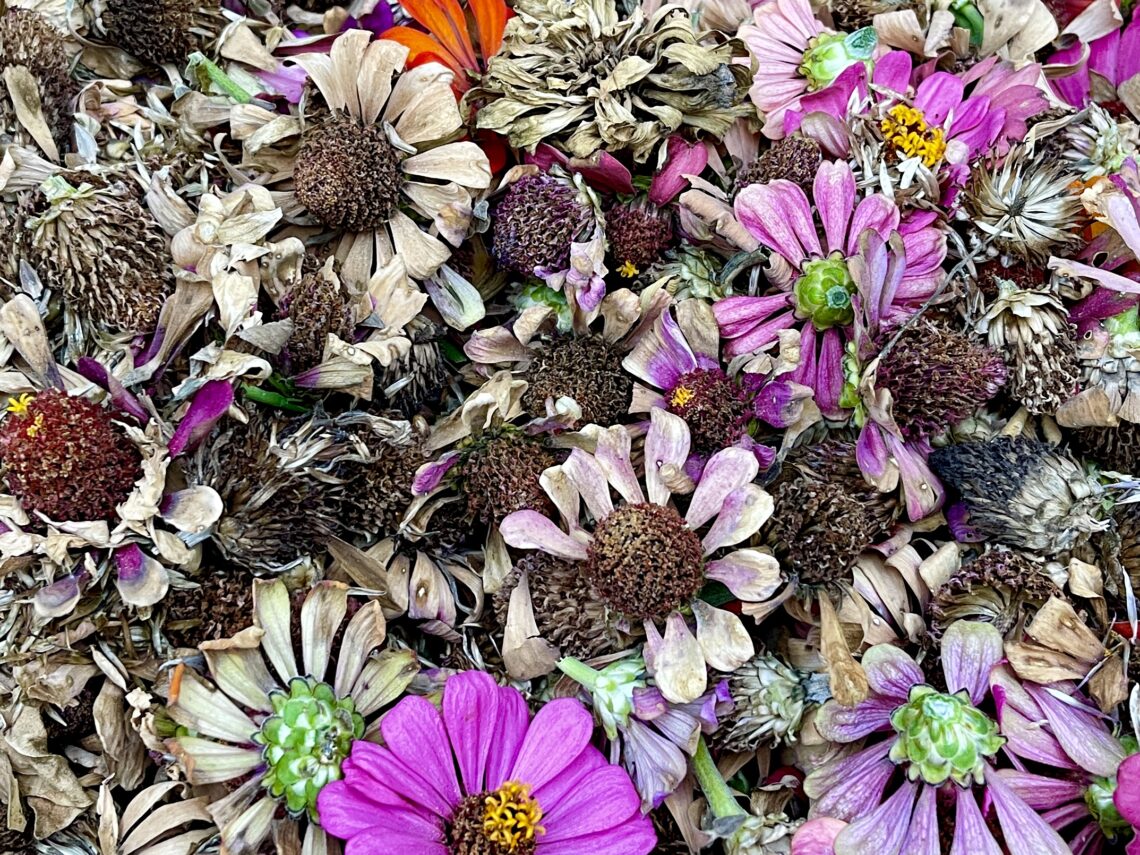
How to Clean Zinnia Beds in the Fall
According to the Farmers’ Almanac—here’s what they say about how to clean zinnia beds in the fall:
- After zinnias flower, cut off the old flowers (a process called “deadheading”) to encourage more flowers to form.
- Zinnias are annuals and will die with the first hard frost of fall. If you want them to reseed, let the last flowers of the season mature fully and scatter their seeds.
Can I tell you that the reseeding of those zinnias makes them a perennial for me?
All summer long I have cut those flowers at their peak and added them to arrangements on tables inside and out.
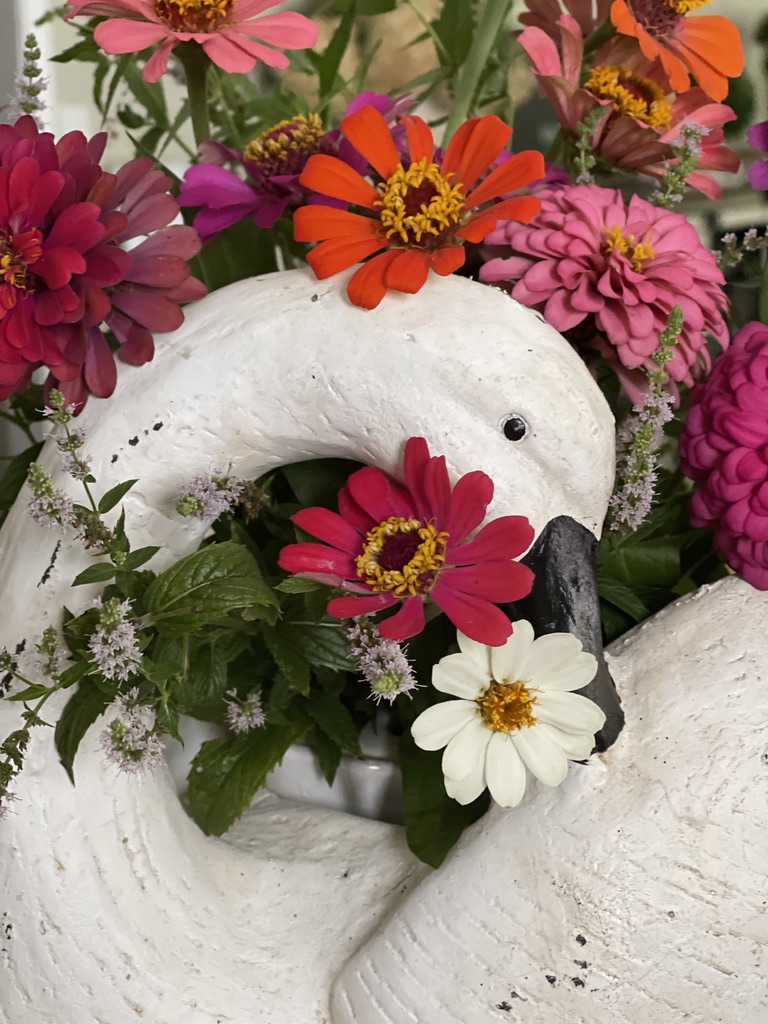
Zinnias just bring me joy.
The ease of harvesting those seeds provides rewarding results.
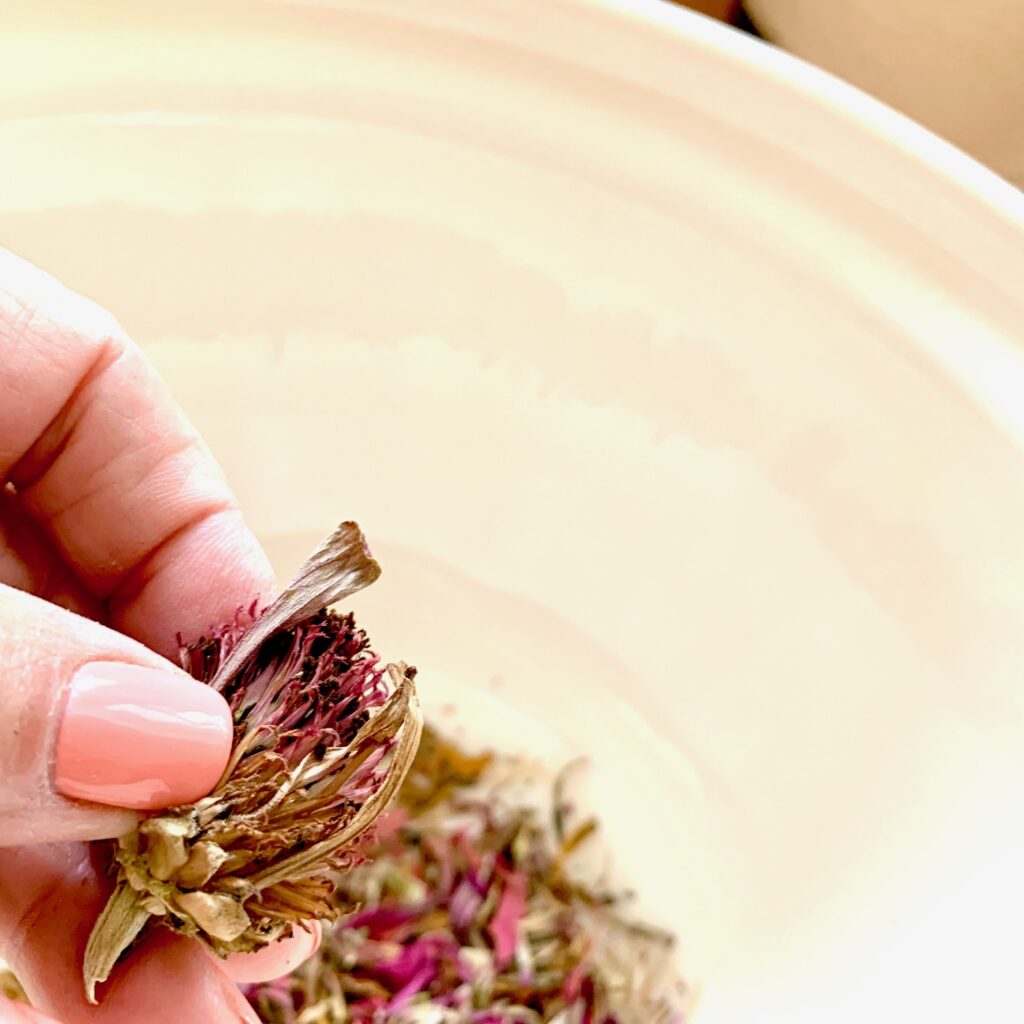
Two things happened differently this year:
- First, our composting center had issues with machinery, so the original planting of adding compost and planting seeds didn’t happen this year. Those zinnias reseeded and returned from dropping seed heads last year.
- Secondly, the drought was difficult on those zinnias and the season of beauty was much shorter than usual.
My zinnias are a a variety that grow to over 7′ tall each year.
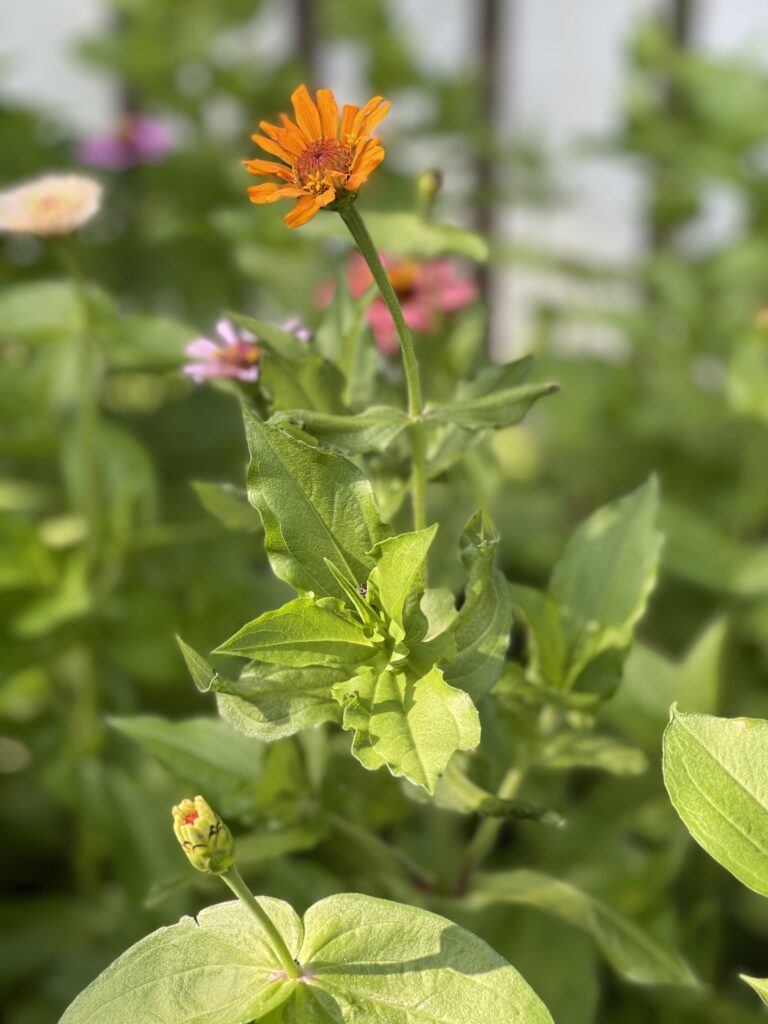
Their height and weight mean a support system has to surround them to prevent them from laying down. We have created our own supports with roping to keep them from laying down as they grew and storms went through.
Next year, we will be working on a new system to support them more in the center of this zinnia bed.
So, why am I talking about zinnias today?
Well…it’s time to clean the zinnia beds and I thought you might like to see what I do in the fall.
Let me say that I haven’t consistently harvested as I have needed to all summer, so there were LOTS of seed heads and spent blooms covering the plants.
Some years I have left seed heads on the zinnias and just fed birds all winter long and then prepared the bed in the spring…but, it looks dreadful.
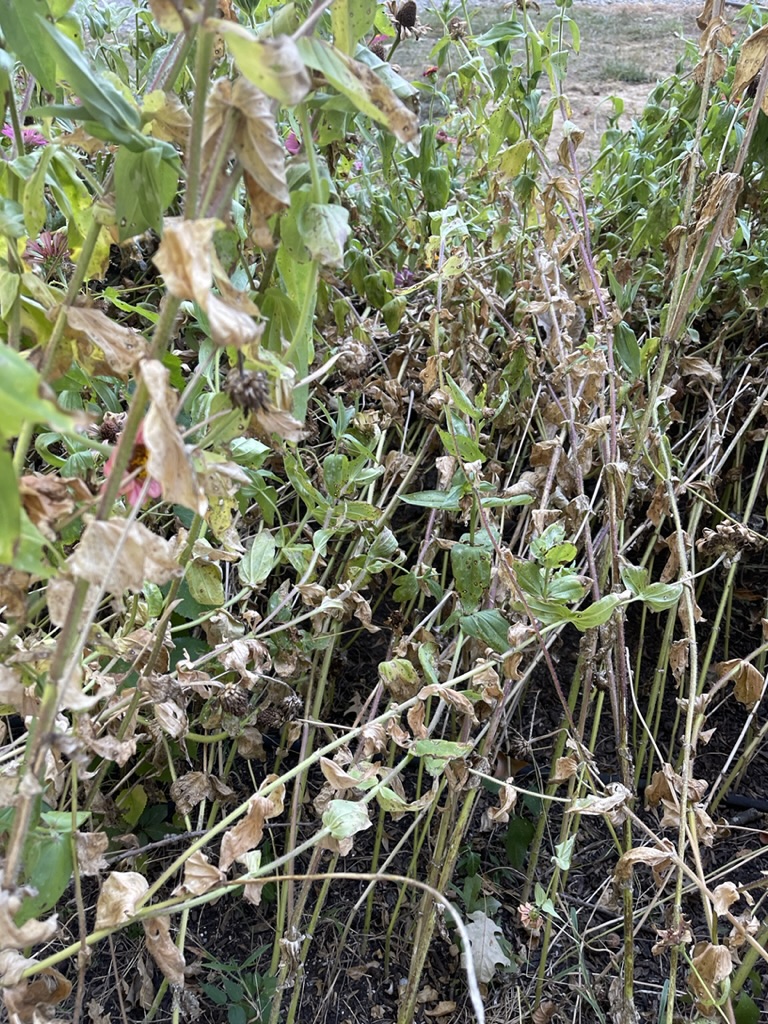
See why those zinnias need to be removed this fall?
Why do you remove the zinnia plants?
- the actual plants will die with frost and are done making them no longer viable.
- the seeds harvested or those left to reseed will create new plants next year.
This year I will just make sure that the birds are fed and my zinnia bed is cleaned so I am a step ahead for planting in the spring.
Here’s my method on how to clean the zinnia bed so that its in great shape for spring planting.
Cleaning Zinnia Beds in the Fall
- First, wear the right clothing. Long sleeves and pants and gloves are a must when doing this. Trust me. There’s something so scratchy and itchy without them. Bare arms and hands and shorts with flip flops make for misery.
- Next, remove any remaining flowers and seed heads and add them to a cardboard box to dry before storing them. If they are not completely dry before storing them, they will mold.
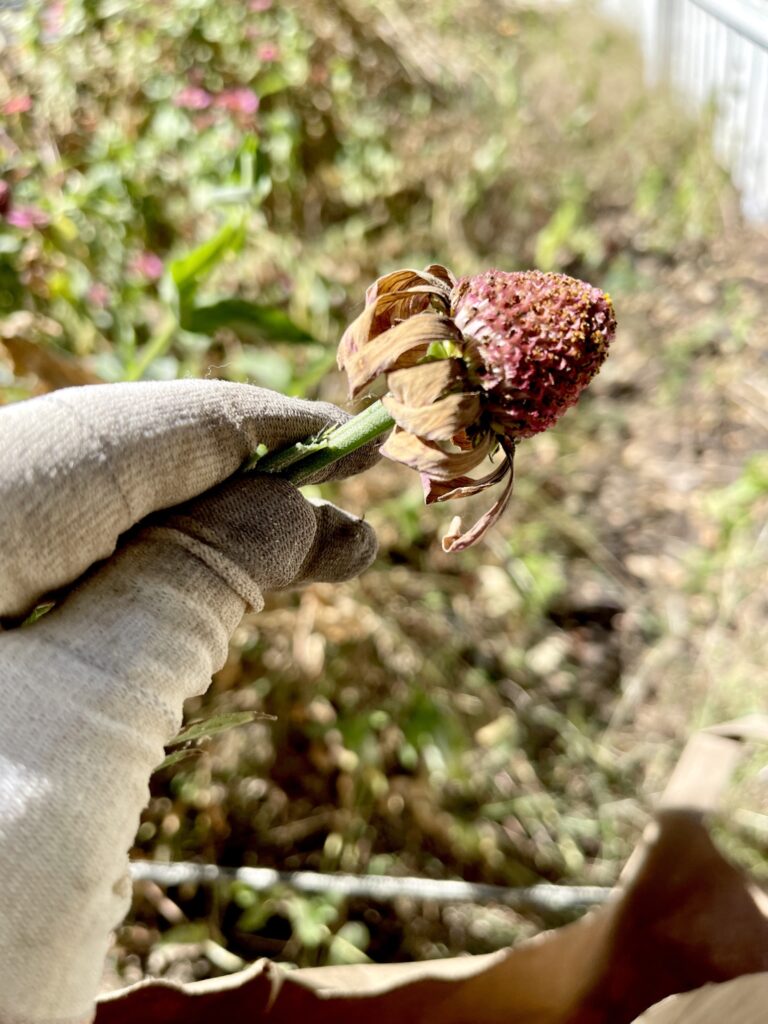
- TIP: Paper bags and cardboard are great for drying before storing to prevent molding.
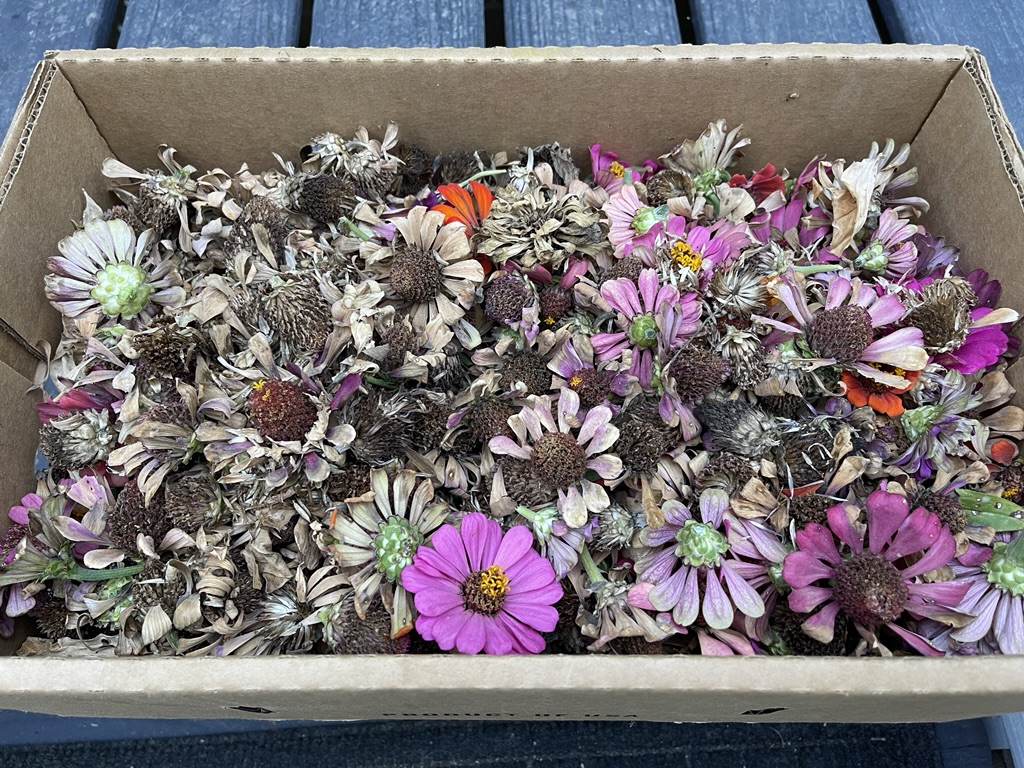
- Pull the zinnia plants out by the roots.
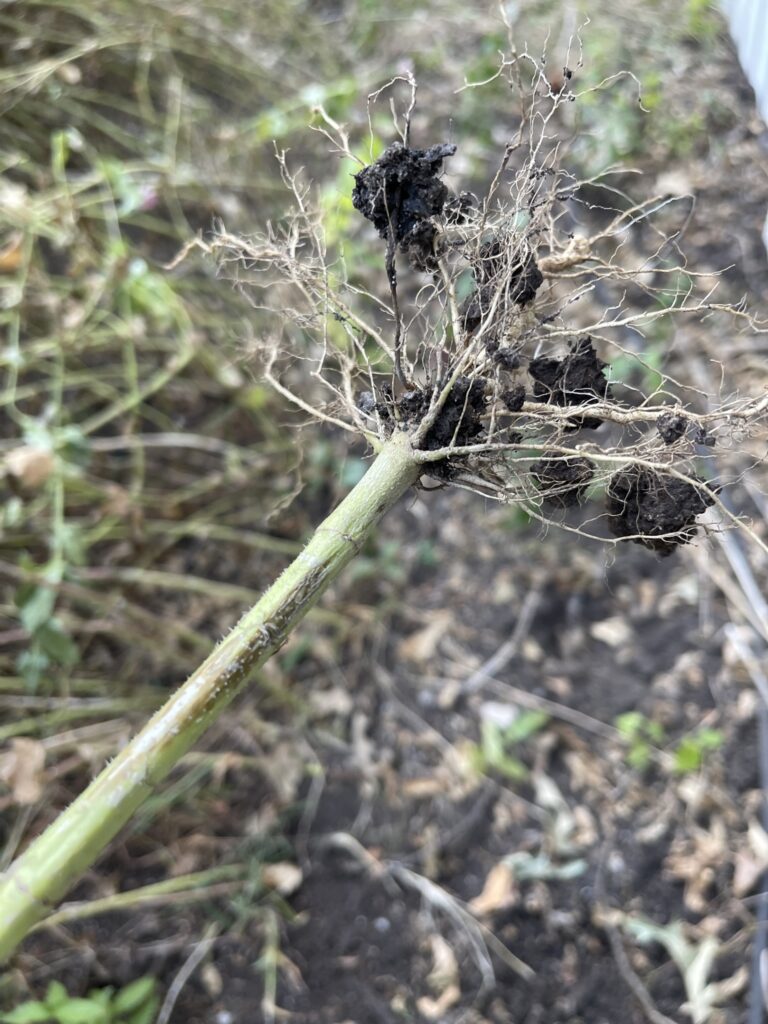
- Discard zinnia plants. Dispose or add those to an area of composting.
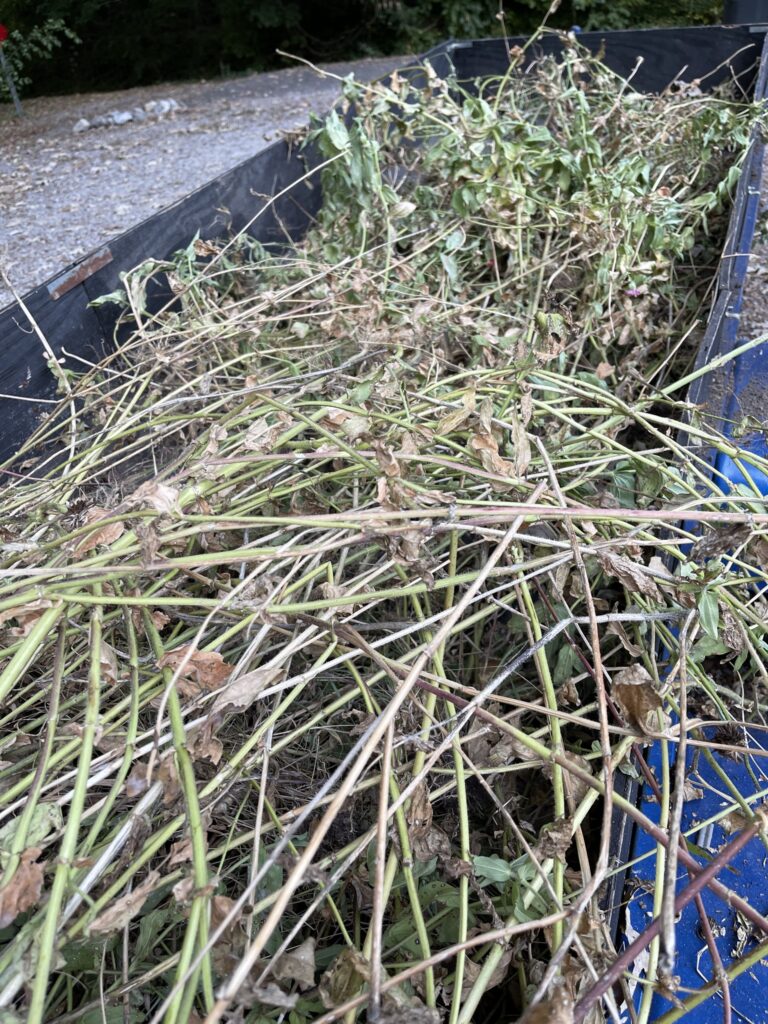
- Once you are finished with removing the seeds and plants, clean up the bed, removing weeds and leaves.
- We often add a layer of compost to make the area look fresh for winter. It will also add nourishment to the dropped zinnia seeds so if we have another late opportunity for the compost we love next spring, reseeded zinnias will still have nutrients to begin the season.
- Since compost will happen later, here’s what the compost looks like when I plant again in the spring. Isn’t it gorgeous?
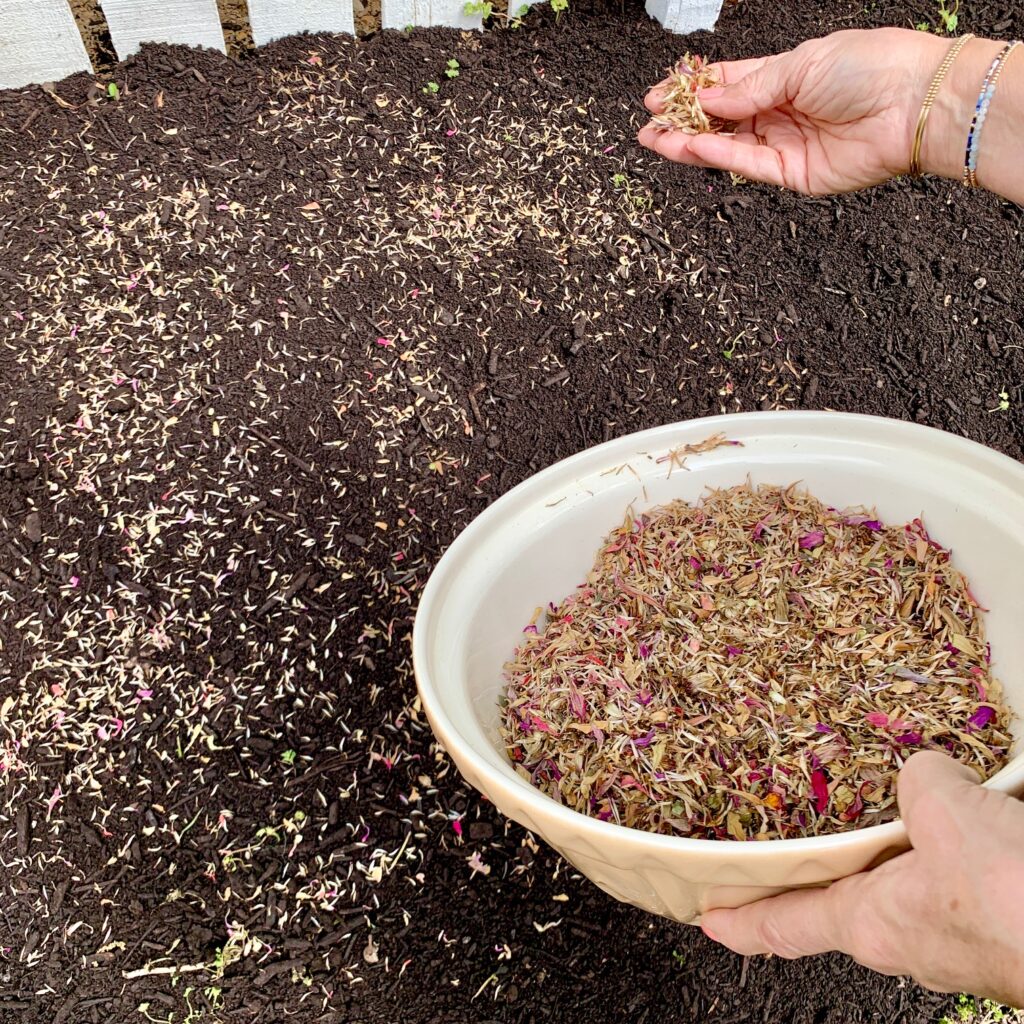
A Few Thoughts as Zinnias were Removed
Zinnia Colors
The reseeded zinnias appeared to be more pinks and purples this year, as you can see from some of the remaining color in the harvested ones in the box.
I have learned that the color of next year’s zinnias is not always determined by the color you harvest.
Guess what often determines the color of the zinnias?
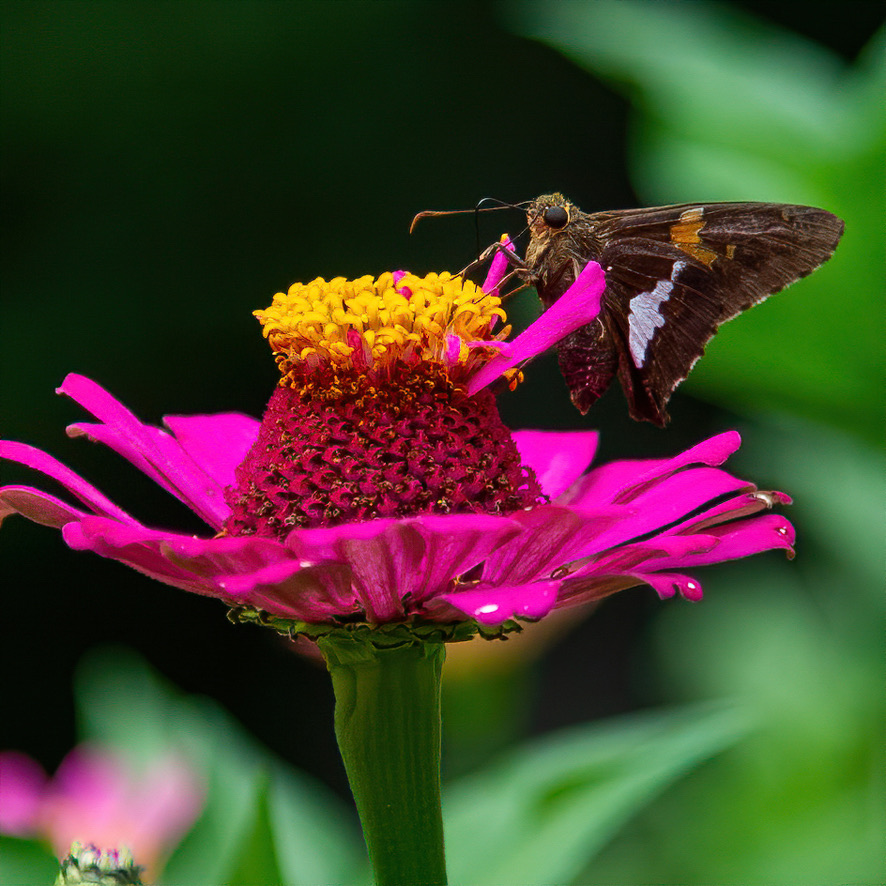
The pollinators. As they move from one flower to the next, THEY can determine what color the seeds from that flower will be for the next year.
Cross pollination can change the color. Crazy, right?
And the more I research, there is a difference with hybrid zinnias. Since I was gifted the original zinnia seeds where all of this began, I am clueless which type of zinnia started this whole growing process.
To gain more colors back in, I may have to look for adding in new seeds into the mix when I plant next year.
Reseeding
Reseeding happens in more than one way.
We had random zinnias that came up everywhere! It was difficult to pull them to clean up the landscape! I eventually pulled them, but if you visited over the summer, you would have seen random zinnias blooming by the picket fence and covering a sidewalk on one side of the house.
As I was cleaning out a bed today, the water meter guy arrived and had to push those volunteer zinnias out of the way to read the meter. Oh, dear!!
I’m sure that the wind carried seeds and perhaps the birds helped to transfer seeds, as well.
Just be prepared to pull those random ones that appear!
Although it was easier just to let those reseeded zinnias grow, I will go back to planting seeds as I usually do next year for a more consistent and even planting of them.
They were beautiful and great that I didn’t have to plant them though!!
Last note…your growing zone may determine whether your zinnias will reseed or not. Zinnias are advertised to be annuals. That’s why I harvest and save seeds to plant for the next year.
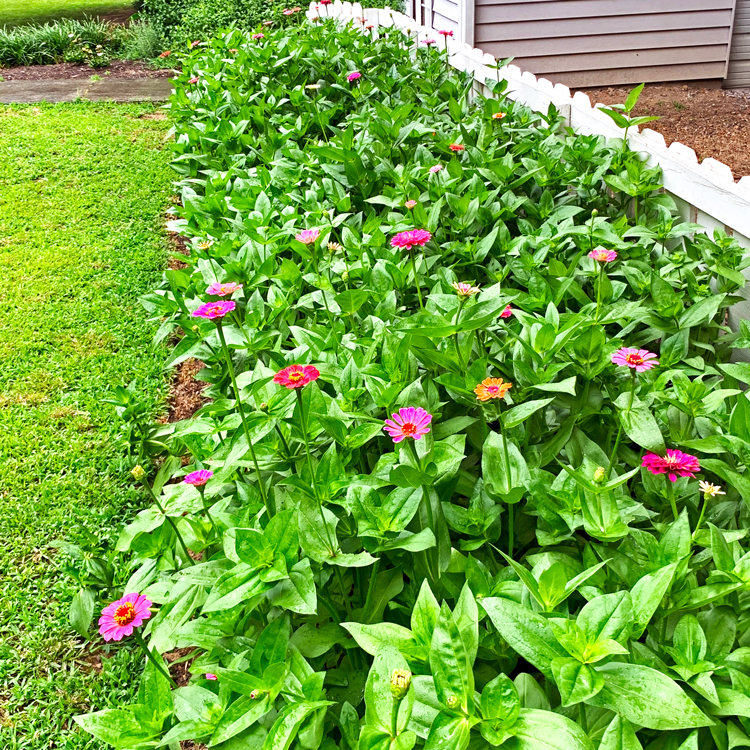
If you need a handy guide, here you go!
Zinnia Bed Cleaning in the Fall
Equipment
- 1 pair hand clippers
- 1 pair gardening gloves
- 1 wheelbarrow or container for plants
Materials
- 1 cardboard box or paper sack for seeds/spent flowers
- long sleeve shirt, pants
Instructions
- Make sure that you have arms and legs covered before beginning.
- Wearing gloves, use scissors or clippers to remove spent flowers and seed heads.

- Add flowers and seed heads to a paper sack OR a cardboard box.

- Pull out zinnia plants by the roots and discard them.

- Use a wheelbarrow, garden container or even trailer to move them to compost or dispose of them.

- Use a rake to clean out the bed.
- Add composting to the top to clean up for fall.
A Few Supplies
Here are a few things that I use to clean out the beds…affiliate links to help you shop at no additional cost to you, and will help us both.

The Holidays at Homes Bundle has only a few more days…
Sale ends on Saturday! If you need holiday planning and inspiration from 27 bloggers, here’s your chance!

You’ll gain instant access to 27 unique digital products curated from the home experts in the four most important categories to help you create the most memorable holiday at home: Holiday Planning; Holiday Decorating and Printables; Holiday Hosting Tutorials; and Holiday DIY and Crafts.
CLICK HERE to get them all!! I think you will love them!

It's Time for Pantry Organization!
You May Also Like
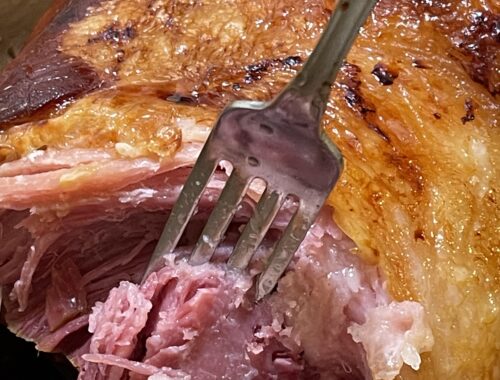
When You’ve Got Baked Ham in the Bag!
February 21, 2023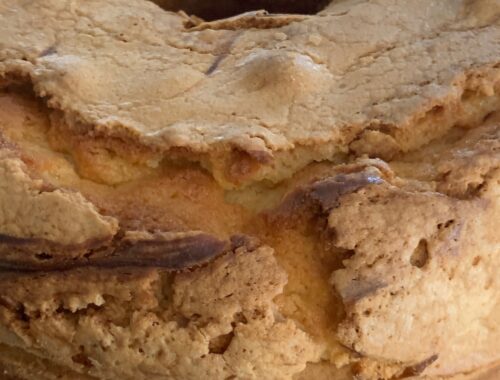
Pound Cake for the Twins in My Life
February 14, 2021
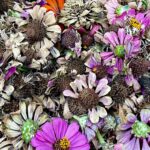
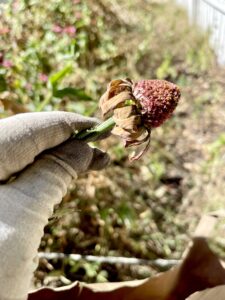
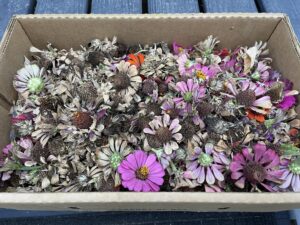
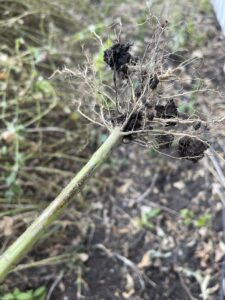
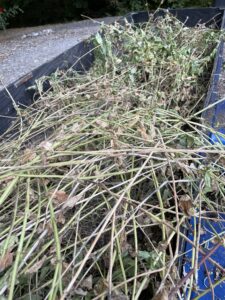

10 Comments
Tammy
You make it look so easy, Leslie. I know how much work you had to put into. So worth it for next year, right?
Leslie J Watkins
Yes..I am so thankful to get them cleaned out and ready for the spring.
Vickie Ramey
Always a beautiful garden! You and Gary take such good care of your yard!
Leslie J Watkins
This year with the drought it has been a beast! But, never ready to see the flowers go. Frost tonight means an ending to the annuals and blooming perennials.
Martha+Wallace
Zinnias are so versatile! They bring those much needed pollinators! I plan to put a row of them in the new garden!
Leslie J Watkins
You will love them…and the fact that they reseed!
Tom Sparkman
Why pull up the roots? Have you seen the Netflix documentary entitled Kiss the ground? It has much to say about the benefits of leaving the root ball in the ground.
Leslie J Watkins
I haven’t heard of that…in our zone I have always cleaned out the beds to begin fresh each spring. I’ll follow up on your documentary. Thanks for the suggestion!
Pingback:
Pingback: